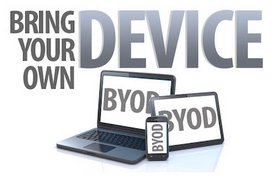"Bring Your Own Device" Policy

Since 2015, ACS Athens, through its commitment to provide the best educational experience to its students, implements the technology policy “Bring Your Own Device – BYOD.” This policy requires all new and existing students entering grades 6-12 to bring their own laptop in the school, always according to the class guidelines and rules of each teaching instructor and the technology policy of the school, as outlined in the Academy and Middle School Program of Studies.
Specifications
As a typical specifications rule, the laptop must be no older than 2 years old (to keep up with current hardware, software and network technologies) and the battery should last for no less than 3 hours. There is no preference in the type of laptop (PC, MacBook, etc).
ACS Athens provides a limited number of laptops on a check-out basis, that are used primarily by individual students, for classroom projects, or on specialized applications as required by faculty.
Although students are welcome to bring tablets, school related applications or assignments may require features like typing or survey type activities that aren’t easily performed on such devices. Therefore, laptops are the preferred devices in ACS Athens.
Description of the BYOD program:
Our primary goal regarding the use of Technology in Education at ACS Athens is:
To envision, design, materialize, support and operate physical and virtual learning spaces, as students live in a world where they can learn anywhere, any time and from anyone.
Context of the BYOD policy:
Today’s students are all digital natives and live and operate in a multimedia world. All media they use in their everyday school life is all in color and they prioritize based on visual learning. They don’t just need, but they demand to have creativity in their learning process. They learn best through trial and error and they constantly connect and collaborate. Most importantly, they expect and know how to access information that is live and interlinked.
Advantages of “Bring Your Own Device” (BYOD) Technology Integration model:
- A device for every student covering his educational needs, offering access to technology at anytime
- Specialized technical staff of the school ensures uniform operation of devices and platforms
- State-of-art firewall and security protocols safeguards network access
- Robust network WiFi infrastructure with large bandwidth ensures optimal connectivity
- Technology Dept. continues to support students with devices on a special case basis.
How BYOD is used:
- School-wide implementation of the i²Flex methodology (see www.isquaredflex.gr)
- Access educational/instructional libraries
- Research online becomes easier and more personalized
- Coursework and assignments are easily accessible and managed
- Access data organization tools
- Web-based applications for classroom polling & quick tests
- Easier production of Audio/Radio podcasting and video projects
- Promoting Digital storytelling
- Easier Language learning
- Easier access of Course companion sites
BYOD Benefits:
- Learning anytime, anywhere without schedule or access restrictions
- Allowing school to devote much-needed funding to other programs or technologies
- Personalized devices
- Devices are commonly more up- to-date with newer features
- Allows for immediate application in the classroom Competitive pricing of tablets, smartphones, and laptop computers—BYOD a viable option for many families
- Replicates a technology-rich environment already common in higher education and business
- Flexibility—support different learners with different needs
BYOD Educational Impact:
- Catalyst for more engaged and motivated students
- Students are held accountable for their learning, puts them in charge
- Encourages continued learning outside of the classroom walls
- Students tap into their individual learning preferences
- Helps students identify skills that will make them life-long learners
- Gives students a preview of how their future workplaces will operate



